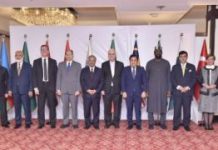KARACHI, Oct 09 (APP):Federal Minister for Planning, Development and Special Initiatives Professor Ahsan Iqbal on Thursday emphasized the need for collective vision, leadership stability, and management excellence to ensure Pakistan’s sustainable progress, terming the current era a defining moment for the country’s “Fourth URAAN” (take-off).
Speaking at the Annual Conference of the Management Association of Pakistan (MAP) titled “Leading Change: From Vision to Excellence,” Ahsan Iqbal said Pakistan stands at a crucial inflection point where unity of purpose and disciplined execution are essential to transform potential into performance.
He said Pakistan has experienced three major phases of growth or “URAANs” since independence — the first following the country’s creation, the second during the early 1990s economic liberalization, and the third from 2013 to 2018 when energy shortages were overcome and CPEC was launched. “Now, we stand at the threshold of our fourth URAAN — an opportunity to make Pakistan a competitive, connected, and confident nation,” he remarked.
Highlighting the need to move from “vision to excellence,” the minister presented what he called the “Atomic Model of Success,” inspired by Pakistan’s nuclear program. He said the program succeeded because of shared purpose, leadership stability, meritocracy, investment in human resources, adequate resources, and functional autonomy. “If we apply this atomic model to our economy and governance, Pakistan can achieve another miracle — this time in economic strength,” he stated.
Ahsan Iqbal stressed that Pakistan is not an underdeveloped but an “undermanaged” economy. “We have talent, resources, and passion — what we often lack is management excellence,” he said, adding that nations that invest in management capital — planning, execution, and accountability — achieve lasting progress.
He urged corporate leaders and managers to play a nation-building role beyond their boardrooms. “Leading change is not about titles but responsibility. Pakistan’s future will not be shaped by politicians alone — it will be shaped by managers who think like nation-builders,” he said.
Referring to recent economic indicators, the minister said inflation has eased, the rupee stabilized, and investor confidence improved. He noted Pakistan’s strengthening partnerships with Saudi Arabia, China, the United States, the European Union, and regional blocs such as the Gulf and Central Asia.
He also outlined the government’s national revival plan, URAAN Pakistan, based on five pillars — Exports, E-Pakistan, Equity and Empowerment, Environment and Food Security, and Energy and Infrastructure. These, he said, form the foundation of Vision 2047 — a roadmap for a strong and self-reliant Pakistan by its centenary.
“Excellence is not an act, it is a habit,” he said, calling on all sectors to reject mediocrity and embrace high standards. “We cannot build a 21st-century Pakistan with 20th-century systems.”
Concluding his address, Ahsan Iqbal invoked Quaid-e-Azam Muhammad Ali Jinnah’s motto of Faith, Unity, Discipline, saying these principles remain vital for Pakistan’s progress. “If we live by these values, our Fourth URAAN will lift not just our economy but also our spirit and destiny,” he added.

















